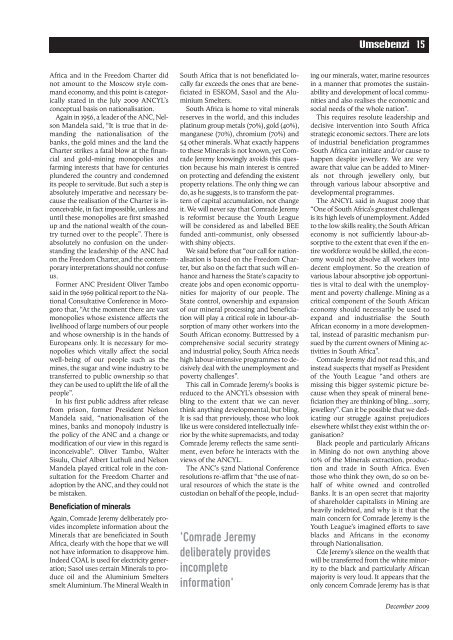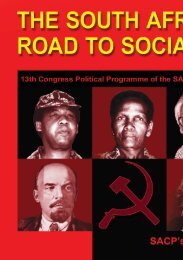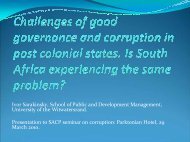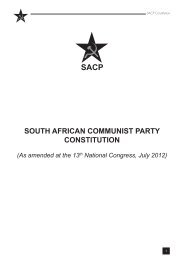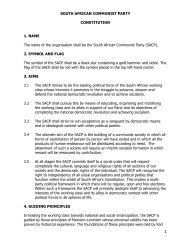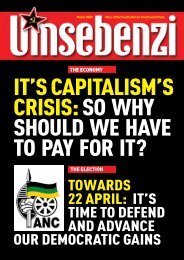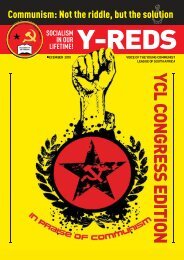Forward to Socialism!! - South African Communist Party
Forward to Socialism!! - South African Communist Party
Forward to Socialism!! - South African Communist Party
Create successful ePaper yourself
Turn your PDF publications into a flip-book with our unique Google optimized e-Paper software.
Umsebenzi 15<br />
Africa and in the Freedom Charter did<br />
not amount <strong>to</strong> the Moscow style command<br />
economy, and this point is categorically<br />
stated in the July 2009 ANCYL’s<br />
conceptual basis on nationalisation.<br />
Again in 1956, a leader of the ANC, Nelson<br />
Mandela said, “It is true that in demanding<br />
the nationalisation of the<br />
banks, the gold mines and the land the<br />
Charter strikes a fatal blow at the financial<br />
and gold-mining monopolies and<br />
farming interests that have for centuries<br />
plundered the country and condemned<br />
its people <strong>to</strong> servitude. But such a step is<br />
absolutely imperative and necessary because<br />
the realisation of the Charter is inconceivable,<br />
in fact impossible, unless and<br />
until these monopolies are first smashed<br />
up and the national wealth of the country<br />
turned over <strong>to</strong> the people”. There is<br />
absolutely no confusion on the understanding<br />
the leadership of the ANC had<br />
on the Freedom Charter, and the contemporary<br />
interpretations should not confuse<br />
us.<br />
Former ANC President Oliver Tambo<br />
said in the 1969 political report <strong>to</strong> the National<br />
Consultative Conference in Morogoro<br />
that, “At the moment there are vast<br />
monopolies whose existence affects the<br />
livelihood of large numbers of our people<br />
and whose ownership is in the hands of<br />
Europeans only. It is necessary for monopolies<br />
which vitally affect the social<br />
well-being of our people such as the<br />
mines, the sugar and wine industry <strong>to</strong> be<br />
transferred <strong>to</strong> public ownership so that<br />
they can be used <strong>to</strong> uplift the life of all the<br />
people”.<br />
In his first public address after release<br />
from prison, former President Nelson<br />
Mandela said, “nationalisation of the<br />
mines, banks and monopoly industry is<br />
the policy of the ANC and a change or<br />
modification of our view in this regard is<br />
inconceivable”. Oliver Tambo, Walter<br />
Sisulu, Chief Albert Luthuli and Nelson<br />
Mandela played critical role in the consultation<br />
for the Freedom Charter and<br />
adoption by the ANC, and they could not<br />
be mistaken.<br />
Beneficiation of minerals<br />
Again, Comrade Jeremy deliberately provides<br />
incomplete information about the<br />
Minerals that are beneficiated in <strong>South</strong><br />
Africa, clearly with the hope that we will<br />
not have information <strong>to</strong> disapprove him.<br />
Indeed COAL is used for electricity generation;<br />
Sasol uses certain Minerals <strong>to</strong> produce<br />
oil and the Aluminium Smelters<br />
smelt Aluminium. The Mineral Wealth in<br />
<strong>South</strong> Africa that is not beneficiated locally<br />
far exceeds the ones that are beneficiated<br />
in ESKOM, Sasol and the Aluminium<br />
Smelters.<br />
<strong>South</strong> Africa is home <strong>to</strong> vital minerals<br />
reserves in the world, and this includes<br />
platinum group metals (70%), gold (40%),<br />
manganese (70%), chromium (70%) and<br />
54 other minerals. What exactly happens<br />
<strong>to</strong> these Minerals is not known, yet Comrade<br />
Jeremy knowingly avoids this question<br />
because his main interest is centred<br />
on protecting and defending the existent<br />
property relations. The only thing we can<br />
do, as he suggests, is <strong>to</strong> transform the pattern<br />
of capital accumulation, not change<br />
it. We will never say that Comrade Jeremy<br />
is reformist because the Youth League<br />
will be considered as and labelled BEE<br />
funded anti-communist, only obsessed<br />
with shiny objects.<br />
We said before that “our call for nationalisation<br />
is based on the Freedom Charter,<br />
but also on the fact that such will enhance<br />
and harness the State’s capacity <strong>to</strong><br />
create jobs and open economic opportunities<br />
for majority of our people. The<br />
State control, ownership and expansion<br />
of our mineral processing and beneficiation<br />
will play a critical role in labour-absorption<br />
of many other workers in<strong>to</strong> the<br />
<strong>South</strong> <strong>African</strong> economy. Buttressed by a<br />
comprehensive social security strategy<br />
and industrial policy, <strong>South</strong> Africa needs<br />
high labour-intensive programmes <strong>to</strong> decisively<br />
deal with the unemployment and<br />
poverty challenges”.<br />
This call in Comrade Jeremy’s books is<br />
reduced <strong>to</strong> the ANCYL’s obsession with<br />
bling <strong>to</strong> the extent that we can never<br />
think anything developmental, but bling.<br />
It is sad that previously, those who look<br />
like us were considered intellectually inferior<br />
by the white supremacists, and <strong>to</strong>day<br />
Comrade Jeremy reflects the same sentiment,<br />
even before he interacts with the<br />
views of the ANCYL.<br />
The ANC’s 52nd National Conference<br />
resolutions re-affirm that “the use of natural<br />
resources of which the state is the<br />
cus<strong>to</strong>dian on behalf of the people, includ-<br />
'Comrade Jeremy<br />
deliberately provides<br />
incomplete<br />
information'<br />
ing our minerals, water, marine resources<br />
in a manner that promotes the sustainability<br />
and development of local communities<br />
and also realises the economic and<br />
social needs of the whole nation”.<br />
This requires resolute leadership and<br />
decisive intervention in<strong>to</strong> <strong>South</strong> Africa<br />
strategic economic sec<strong>to</strong>rs. There are lots<br />
of industrial beneficiation programmes<br />
<strong>South</strong> Africa can initiate and/or cause <strong>to</strong><br />
happen despite jewellery. We are very<br />
aware that value can be added <strong>to</strong> Minerals<br />
not through jewellery only, but<br />
through various labour absorptive and<br />
developmental programmes.<br />
The ANCYL said in August 2009 that<br />
“One of <strong>South</strong> Africa’s greatest challenges<br />
is its high levels of unemployment. Added<br />
<strong>to</strong> the low skills reality, the <strong>South</strong> <strong>African</strong><br />
economy is not sufficiently labour-absorptive<br />
<strong>to</strong> the extent that even if the entire<br />
workforce would be skilled, the economy<br />
would not absolve all workers in<strong>to</strong><br />
decent employment. So the creation of<br />
various labour absorptive job opportunities<br />
is vital <strong>to</strong> deal with the unemployment<br />
and poverty challenge. Mining as a<br />
critical component of the <strong>South</strong> <strong>African</strong><br />
economy should necessarily be used <strong>to</strong><br />
expand and industrialise the <strong>South</strong><br />
<strong>African</strong> economy in a more developmental,<br />
instead of parasitic mechanism pursued<br />
by the current owners of Mining activities<br />
in <strong>South</strong> Africa”.<br />
Comrade Jeremy did not read this, and<br />
instead suspects that myself as President<br />
of the Youth League “and others are<br />
missing this bigger systemic picture because<br />
when they speak of mineral beneficiation<br />
they are thinking of bling...sorry,<br />
jewellery”. Can it be possible that we dedicating<br />
our struggle against prejudices<br />
elsewhere whilst they exist within the organisation?<br />
Black people and particularly <strong>African</strong>s<br />
in Mining do not own anything above<br />
10% of the Minerals extraction, production<br />
and trade in <strong>South</strong> Africa. Even<br />
those who think they own, do so on behalf<br />
of white owned and controlled<br />
Banks. It is an open secret that majority<br />
of shareholder capitalists in Mining are<br />
heavily indebted, and why is it that the<br />
main concern for Comrade Jeremy is the<br />
Youth League’s imagined efforts <strong>to</strong> save<br />
blacks and <strong>African</strong>s in the economy<br />
through Nationalisation.<br />
Cde Jeremy’s silence on the wealth that<br />
will be transferred from the white minority<br />
<strong>to</strong> the black and particularly <strong>African</strong><br />
majority is very loud. It appears that the<br />
only concern Comrade Jeremy has is that<br />
December 2009


